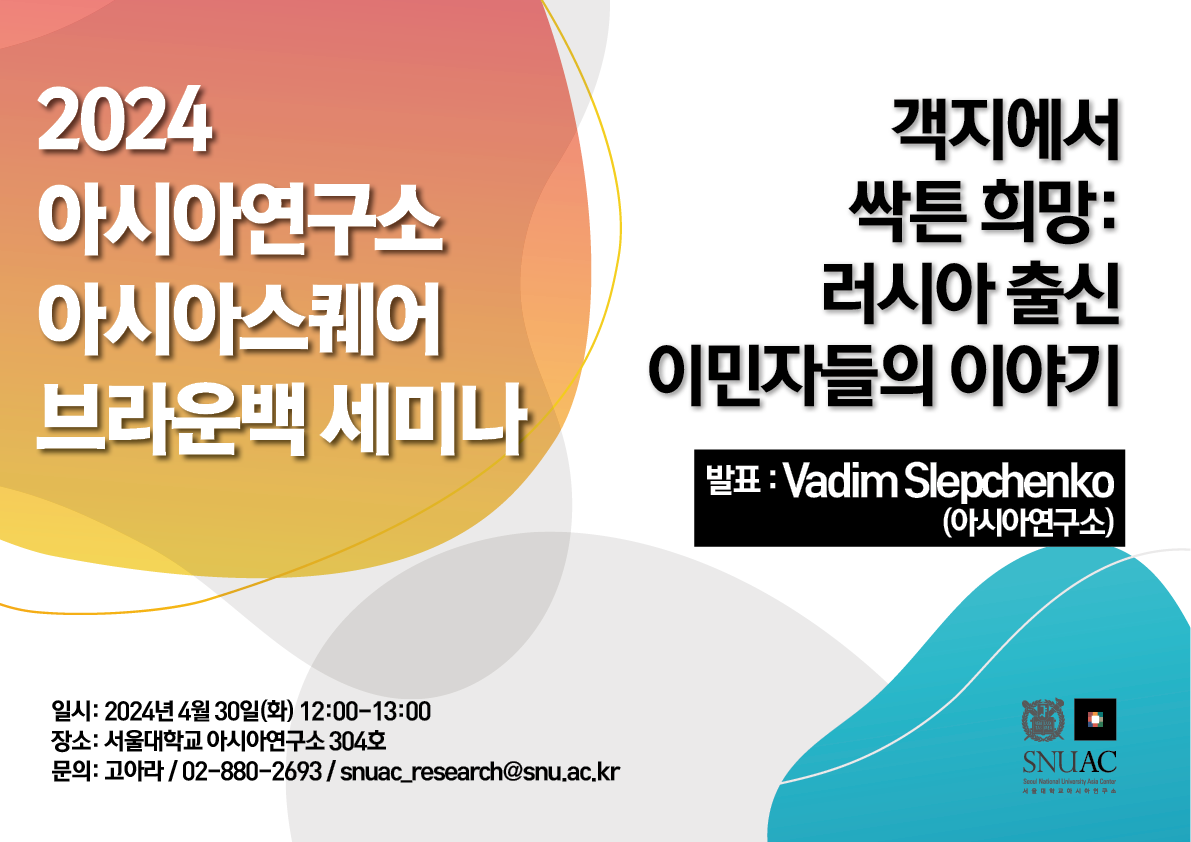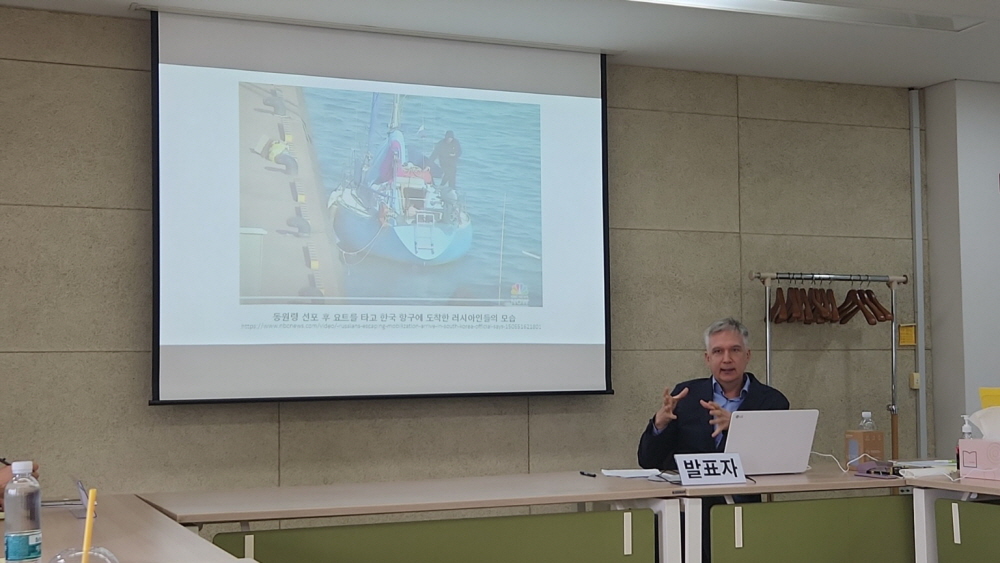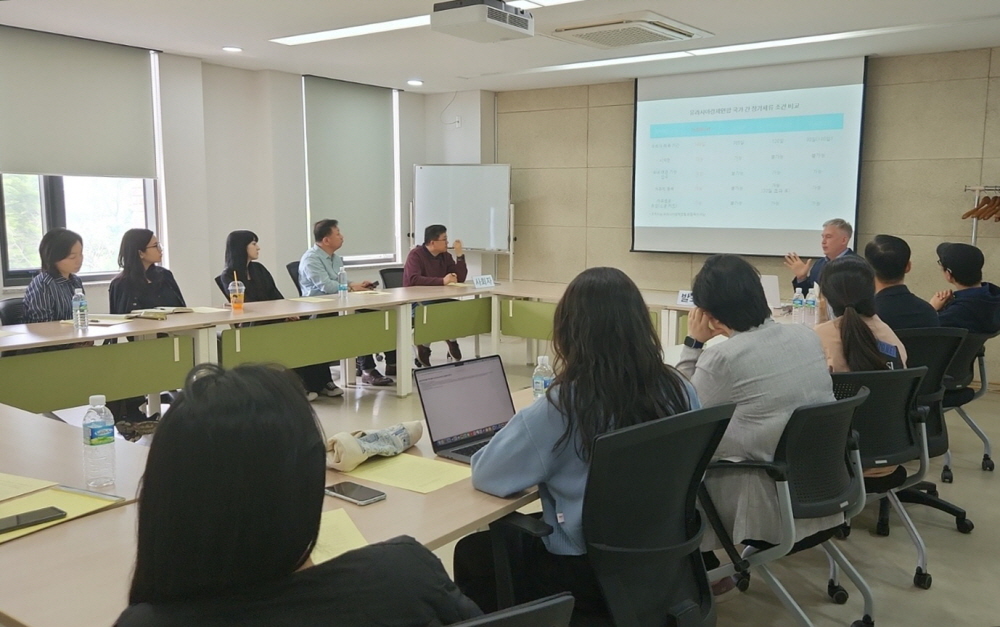Hope in a Foreign Land: Stories of Russian Immigrants
- Date: April 30th, Tuesday, 2024, 12:00 – 13:00
- Location: Room 304, SNUAC (Bldg. 101)
Presenter: Vadim Slepchenko (SNUAC)
On April 30, 2024, Vadim Slepchenko (Research Fellow, CECAS, SNUAC) gave a presentation on the topic of “Hope in a Foreign Land: Stories of Russian Immigrants”. This presentation tracked and analyzed the causes, current status, and impacts of the largest wave of Russian emigration since the collapse of the Soviet Union following the Russian invasion of Ukraine in 2022.
Between the October Revolution of 1917 and 1920, approximately 2 million people left Russia. After 2022, it’s estimated that around 1.5 million people have left Russia. Based on these figures, Dr. Slepchenko conducted structured interviews, local surveys, and policy analyses on 10 Russian Relocants (Russian war emigrants residing abroad) in Armenia (Yerevan) and Georgia (Tbilisi) from February 19th to 23rd, 2024. Those who decided to emigrate from Russia were primarily social activists, politicians, and journalists, driven generally by fears of political persecution. Additionally, IT professionals began emigrating due to concerns about safety amid wartime conditions and fears of deteriorating economic or ideological situations in Russia. They also noted that President Putin’s partial mobilization decree on September 21, 2022, triggered a second wave of emigration among draft evaders. Subsequent emigrants fleeing the Ukrainian war were argued not to fit the traditional refugee definition and were seen as high-skilled personnel, positively impacting host country economies, unlike other refugees.
Dr. Slepchenko estimated that between 500,000 and 1.3 million Russians left Russia in the first year of the invasion. Most migrated to visa-exempt countries such as Armenia, Azerbaijan, Turkey, Uzbekistan, Kyrgyzstan, Tajikistan, and Mongolia. Over 15% have returned to Russia, but many still reside abroad. He mentioned preferences for entry into Russia with national passports, mentioning the Eurasian Economic Union member states and countries with visa-free agreements with Russia. Among them, Armenia, which signed a visa-free agreement with Russia, emerged as a major host for Russian refugees, with approximately 110,000 residing there, tracked through the opening of bank accounts. It was reported that among these refugees, 4,000 were involved in entrepreneurial activities and 2,500 were registered as legal entities.
Brief views on Russian refugees in Armenia were also shared, noting occasional local grievances over rising real estate prices or job competition, but overall, they were seen positively for their contributions to urban revitalization activities and support for Ukrainian/Nagorno-Karabakh refugees.
Dr. Slepchenko briefly explained why there are few Russian immigrants in Korea, citing visa restrictions, impossibility of visa runs, low refugee recognition rates for draft evasion or political asylum, and the influence of the K-ETA system.
Finally, as a Research Fellow at the CECAS, SNUAC, future research plans were shared. Through the National Research Foundation’s Humanities and Social Sciences Research Support Project, research on the economic participation and contributions of Russian “Relocants” to host countries will be conducted. Additionally, he expressed interest in researching the factors that attract Russians to settle in immigration countries. Dr. Slepchenko also expressed an overarching interest in the issues faced by emigrants from Russia following the Ukrainian war.




